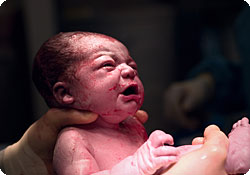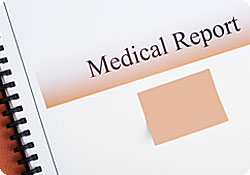Mr Watkins gave the State a notice of claim pursuant to Division 1 of PIPA seeking damages for negligence on behalf of his infant son as a result of an injury suffered when the child was born at the Nambour Hospital.
 By correspondence written pursuant to s.20 PIPA, the State denied liability in respect of the claim, and offered to settle the claim “in the amount of $nil”. The basis of the State’s denial of liability was said to be “detailed in the enclosed report of Professor Alistair MacLennan …”.
By correspondence written pursuant to s.20 PIPA, the State denied liability in respect of the claim, and offered to settle the claim “in the amount of $nil”. The basis of the State’s denial of liability was said to be “detailed in the enclosed report of Professor Alistair MacLennan …”.
Section 20 PIPA, relevantly provides:
“20 Respondent must attempt to resolve claim
(1) Within the period prescribed under a regulation or, if no period is prescribed, within 6 months after a respondent receives a complying part 1 notice of claim, the respondent mustâ
(a) take reasonable steps to inform himself, herself or itself about the incident alleged to have given rise to the personal injury to which the claim relates; and
(b) give the claimant written notice statingâ
(i) whether liability is admitted or denied; and
(ii) if contributory negligence is claimed, the degree of the contributory negligence expressed as a percentage; and
(c) if the claimant made an offer of settlement in part 2 of the notice of a claim, inform the claimant whether the respondent accepts or rejects the offer, or if the claimant did not make an offer of settlement in part 2 of the notice, invite the claimant to make a written offer of settlement; and
(d) make a fair and reasonable estimate of the damages to which the claimant would be entitled in a proceeding against the respondent; and
(e) make a written offer, or counteroffer, of settlement to the claimant setting out in detail the basis on which the offer is made, or settle the claim by accepting an offer made by the claimant.
…
 (3) An offer, or counteroffer, of settlement must be accompanied by a copy of medical reports, assessments of cognitive, functional or vocational capacity and all other material, including documents relevant to assessing economic loss, in the offerer’s possession that may help the person to whom the offer is made make a proper assessment of the offer.
(3) An offer, or counteroffer, of settlement must be accompanied by a copy of medical reports, assessments of cognitive, functional or vocational capacity and all other material, including documents relevant to assessing economic loss, in the offerer’s possession that may help the person to whom the offer is made make a proper assessment of the offer.
…”
Professor MacLennan’s report referred to three letters of instruction from the State’s solicitors. Documentation inadvertently disclosed with the report also revealed the probable existence of a file note of a prior discussion between Professor MacLennan and the State’s solicitors.
Consequently, Mr Watkin’s sought orders pursuant to s.35 PIPA for the disclosure of documentation in the State’s possession connected with the report of Professor MacLennan (“the communications”). The State opposed the application.
Before the learned primary judge (Atkinson J) and the Court of Appeal, the State did not contend that the communications were:
- not relevant to the matters in issue between the parties.
- not material which “may help the person to whom the offer [required by s.20(1)(e) PIPA] is made make a proper assessment of the offer” within the meaning of s.20(3) PIPA.
Rather, the sole question before Atkinson J was whether the legal professional privilege which was assumed to attach to the communications had been lost.
In that regard, the solicitor acting for the State deposed that the letters of instruction and file note “were brought into existence for the dominant purpose of anticipated litigation”. On that footing, the State claimed legal professional privilege in respect of the communication. The solicitor did not depose that the report of Professor MacLennan itself was commissioned for the dominant purpose of anticipated litigation.
Germane to Atkinson J’s determination was that Professor MacLennan had erroneously referred to one of the letters of instruction as containing a particular fact upon which he relied.
Atkinson J acknowledged the uncontroversial propositions that “letters of instruction from a legal representative to an expert whose opinion is sought are usually protected from disclosure by legal professional privilege” and that “legal professional privilege is a substantive common law right which cannot be abrogated by legislation except expressly or by necessary implication”. Her Honour went on to conclude:
“The reference made to the material in the letter of instruction by Professor MacLennan is of itself sufficient to give rise to a right in the applicant to see the letters of instruction which apparently formed part of the factual basis of Professor MacLennan’s opinion … It appears that the reference by Professor MacLennan to the letter of instruction saying that Ms Pasalic lived about 40 minutes from the hospital was inaccurate. That fact does not appear in any letter of instruction. However it does appear that other factual material which forms part of the basis of Professor MacLennan’s opinion is sourced from the letters of instruction. It would be quite unfair to the applicant to be left with an incomplete and, as it turns out, erroneous impression of the letters of instruction. They should be disclosed as the privilege would otherwise inhere in the contents has been waived by implication. Their disclosure will reveal part of the factual basis for Professor MacLennan’s report and also the nature and purpose of a telephone conversation between [the solicitor] and Professor MacLennan.”
The State submitted that there could be no waiver by implication when a document which refers to the otherwise privileged document itself is subject to statutory compulsory disclosure. Her Honour rejected that proposition on the basis that, in this instance, the report of Professor MacLennan was disclosed voluntarily. Her Honour did, however, qualify that comment by noting that the compulsory disclosure requirements of s.27 and s.30 PIPA did not, in any event, alter her view because the question did not depend on whether the document which refers to a privileged document is itself subject to privilege.
The majority of the Court of Appeal, speaking by Keane JA, rejected the view that privilege in the communications had been waived by reason of Professor MacLennan’s reference to them in his report and/or unfairness. However, Keane JA opined that the decision below could be sustained on a much broader basis – namely “that s.20 PIPA, understood in its statutory context, is not to be interpreted with a presumption in favour of the preservation of privilege”.
 The State contended that s.30 PIPA preserved the privilege which otherwise clothed the communications, in that the solicitor had deposed such communications “were brought into existence for the dominant purpose of litigation”. Keane JA rejected that contention, concluding the Professor MacLennan’s report had never been privileged2:
The State contended that s.30 PIPA preserved the privilege which otherwise clothed the communications, in that the solicitor had deposed such communications “were brought into existence for the dominant purpose of litigation”. Keane JA rejected that contention, concluding the Professor MacLennan’s report had never been privileged2:
“The purpose of the provisions of Division 1 to Division 4 of Part 1 of Chapter 2 of the PIPA is to ensure that sound claims are admitted and unsound claims are abandoned; in this way, unnecessary litigation of those claims is to be avoided. In such a context, it would be difficult, to say no more, to suggest that a report, obtained by a recipient of a claim for use in a procedure intended by the legislature to determine whether the person on whom the claim is made should accept or reject the claim is justified, was commissioned for the dominant purpose of litigation. The evident purpose of these provisions of the PIPA inevitably inform the actions of those who act in conformity with their requirements. The purpose is to ensure that good claims are paid and bad claims are abandoned before proceedings are commenced in court; that is to say, the “dominant” purpose is that there should not be litigation of the claim at all if that is reasonably possible.
In my respectful opinion, if Professor MacLennan’s report was obtained for the purposes of the pre-litigation procedures contemplated by the provisions of Division 1 to Division 4 of Part 1 of Chapter 2 of the PIPA, and particularly s.20, no privilege could have attached to it. The obtaining of a report by a party to enable that party to observe the requirements of s.20 of the PIPA is, in my opinion, not apt to clothe the report with legal professional privilege so as to engage s.30 of PIPA. Indeed, I consider that s.20 is distinctly inconsistent with such a result. Section 20(3) and s.30 must be given an harmonious operation: the latter cannot be intended to cancel the former.”
Keane JA went on to state that s.30(1) PIPA was concerned to remove from the scope of compulsory disclosure, under s.20 or s.27, documents whose claim to privilege arises because they were brought into existence for reasons other than compliance with s.20 or s.27 of PIPA.
Having concluded that Professor MacLennan’s report was never privileged, the question remained whether the communications associated with the commissioning of the report were privileged. Keane JA answered that question in favour of Mr Watkins concluding3:
“… if the report to which the communications are connected was never itself the subject of privilege, the associated communications were also never the subject of privilege.
Consequently, the point is not that PIPA impliedly abrogates privilege in communications associated with the production of a report to be used in litigation; the point is that the effect of s.20 PIPA is that the report and associated communications were never the subject of privilege.
The language of s.20(3) is not to be read down by a presumption in favour of confidentiality in circumstances where a process of negotiation mandated by the statute is intended to result in agreements which will obviate the need for litigation.”
Keane JA did, however, point out that his conclusion would not be as far reaching as it first might seem. First, he pointed out that communications which are not apt to help the offeree assess the offer required by s.20(1)(e) PIPA need not be provided under s.20(3) PIPA. Second, and saliently, he reasoned that reports which are obtained for the dominant purpose of enabling a respondent to a claim to take legal advice on the claim will be privileged: such reports being outside the scope of s.20(3) and, even if they fall within descriptive words in s.27(1)(a)(i), the benefit of the privilege will be maintained by s.30(1) of PIPA.
In stating those qualifications, Keane JA observed that it had not been suggested that Professor MacLennan’s report had been obtained for the purpose of the State obtaining legal advice.
The qualifications Keane JA placed upon his conclusions have fuelled early debate. Some have suggested that his conclusions should be contained to the facts of Watkins on the basis that the disclosure of Professor MacLennan’s report in that instance was expressly stated to be made in accordance with s.20 of PIPA. Others have contended that Keane JA’s stated qualification contemplates that a notice of claim might be delivered pursuant to Division 1 PIPA in circumstances where it is still possible to obtain a report of an expert for the dominant purpose of providing legal advice.
It is submitted the contentions misconceive the practical breadth of the principle. It is not possible to protect the material from disclosure by artificially nominating the purpose for which it is obtained.
From a practical point of view, once a notice of claim is delivered upon a respondent, the respondent could hardly, or at least very rarely, contend that its inquiries of an expert or other witnesses could be for any other dominant purpose other than to inform itself about the incident and to respond to the notice of claim as required by s.20 PIPA. If such evidence or communications in any way inform the respondent in the formulation of the offer it is obliged to make pursuant to s.20(1)(e), the evidence and communications will be disclosable pursuant to s.20(3). If the evidence does not inform in that way, it is more likely than not to be disclosable pursuant to s.27 in any event. The principle will extend to file notes of oral opinions and will not be limited to formal reports. Further, the principle is not limited to evidence of experts.
There will remain occasions when privilege will be preserved. For example, in the medical negligence context, a hospital might recognise at a very early stage that an incident is likely to lead to litigation, prompting it to seek legal advice prior to any claim notification pursuant to PIPA. Evidence obtained for the purposes of providing legal advice at that stage would be privileged and that privilege would be maintained by s.30(1) PIPA upon notification of the claim.
Similarly, as Kirby J pointed out on the High Court special leave application, there may be some instances in which an event occurs prompting a hospital to obtain expert opinion to assist in managing the risk associated with a similar event occurring again. In that instance, the evidence is likely to retain its privilege.
The principle will not be limited to material obtained by respondents to claims. Claimants have an obligation to disclose reports and other documentary material about the incident giving rise to the claim pursuant to s.22 PIPA consistent with the respondent’s obligation pursuant to s.27 PIPA. Consequently, if the claimant obtains evidence for the purpose of prosecuting the claim, that evidence will not be privileged whether or not it be favourable to the claimant and whether or not the claimant intends to rely upon the material.
Practitioners have proceeded upon the basis that PIPA requires a “cards on the table” approach for some time. Watkins v State of Queensland makes it abundantly clear that the legislature intended that all cards held by both parties should be on the table, and that those cards should be face up.
David Schneidewin
Footnotes
- [2007] QCA 430
- [2007] QCA 430, starting at paragraph [67].
- [2007] QCA 430, at para [73].




 By correspondence written pursuant to s.20 PIPA, the State denied liability in respect of the claim, and offered to settle the claim “in the amount of $nil”. The basis of the State’s denial of liability was said to be “detailed in the enclosed report of Professor Alistair MacLennan …”.
By correspondence written pursuant to s.20 PIPA, the State denied liability in respect of the claim, and offered to settle the claim “in the amount of $nil”. The basis of the State’s denial of liability was said to be “detailed in the enclosed report of Professor Alistair MacLennan …”. (3) An offer, or counteroffer, of settlement must be accompanied by a copy of medical reports, assessments of cognitive, functional or vocational capacity and all other material, including documents relevant to assessing economic loss, in the offerer’s possession that may help the person to whom the offer is made make a proper assessment of the offer.
(3) An offer, or counteroffer, of settlement must be accompanied by a copy of medical reports, assessments of cognitive, functional or vocational capacity and all other material, including documents relevant to assessing economic loss, in the offerer’s possession that may help the person to whom the offer is made make a proper assessment of the offer. The State contended that s.30 PIPA preserved the privilege which otherwise clothed the communications, in that the solicitor had deposed such communications “were brought into existence for the dominant purpose of litigation”. Keane JA rejected that contention, concluding the Professor MacLennan’s report had never been privileged2:
The State contended that s.30 PIPA preserved the privilege which otherwise clothed the communications, in that the solicitor had deposed such communications “were brought into existence for the dominant purpose of litigation”. Keane JA rejected that contention, concluding the Professor MacLennan’s report had never been privileged2: